
7 minute read
FSU Music Charts its Course
On a Friday the 13th in March, College of Music students, faculty, and staff paused their vigorous pace of classes, concerts, and research for a well-deserved spring break.
Two days earlier Florida State University had announced that due to the expanding coronavirus, classes would all move online beginning March 23rd with the hope that face-to-instruction would resume on April 6th. Unfortunately, in response to Governor Ron DeSantis’ “Safer at Home” order the University was forced to close on April 3rd. The entire campus shifted to remote teaching, and all performances were cancelled or postponed. The incredibly busy spring semester of on-campus music evaporated abruptly.
It is in such challenging moments that the amazing creativity in the College shines. So it was that faculty members worked tirelessly to convert in-person classes to online meetings and sought expertise to utilize the best available technology for sharing music remotely. More importantly, they redoubled their efforts to connect with students, helping them adapt to the challenges they faced. Even as the buildings remained silent, homes now were filled with music and lively discussion as the faculty-student dynamic – the heart of what the College is – continued. When the end of the spring semester arrived, despite these unique challenges, our students again distinguished themselves with new teaching positions, winning auditions for professional and military ensembles, entering positions in music therapy, and continuing their education in prestigious graduate schools.
For Lindsey Haerle (B.M.E. ’20), an instrumental music education major in the midst of student teaching and job hunting, her last semester prior to graduation meant a rapid shift to remote music-making with her students. Her successful interview for a job at Sabal Palm Elementary School in Collier County was conducted remotely and required careful planning of her virtual interview location and how to keep the environment professional and quiet. As she begins her new job, she will be teaching some students face-to-face with other students interacting remotely from home. The creative energy to reimagine curriculum and resources is something that Haerle developed during her years at FSU. “My teachers, advisors, and peers in the College of Music fully prepared me for my teaching career. I especially appreciate being part of this close-knit family of musicians, first as a student and now as an alum.”

With everyone working and studying remotely, the College took advantage of the unusually empty buildings. Associate Dean for Operations William Fredrickson led a summer renovation of 71 practice rooms on the first floor of the Housewright Music Building including paint, carpeting, new sound panels, and a return to colors characteristic of the original facility when it opened in 1979. Lighting and technology upgrades also added versatility and energy-saving features to the buildings. The first personalized bricks were also added to the breezeway between the Kuersteiner and Housewright Music Buildings in August 2020. This Music Legacy Walkway Program is now available to College of Music alumni and supporters. We hope you can visit the Callaway Courtyard and the Legacy Walkway the next time you are able to safely come to campus.
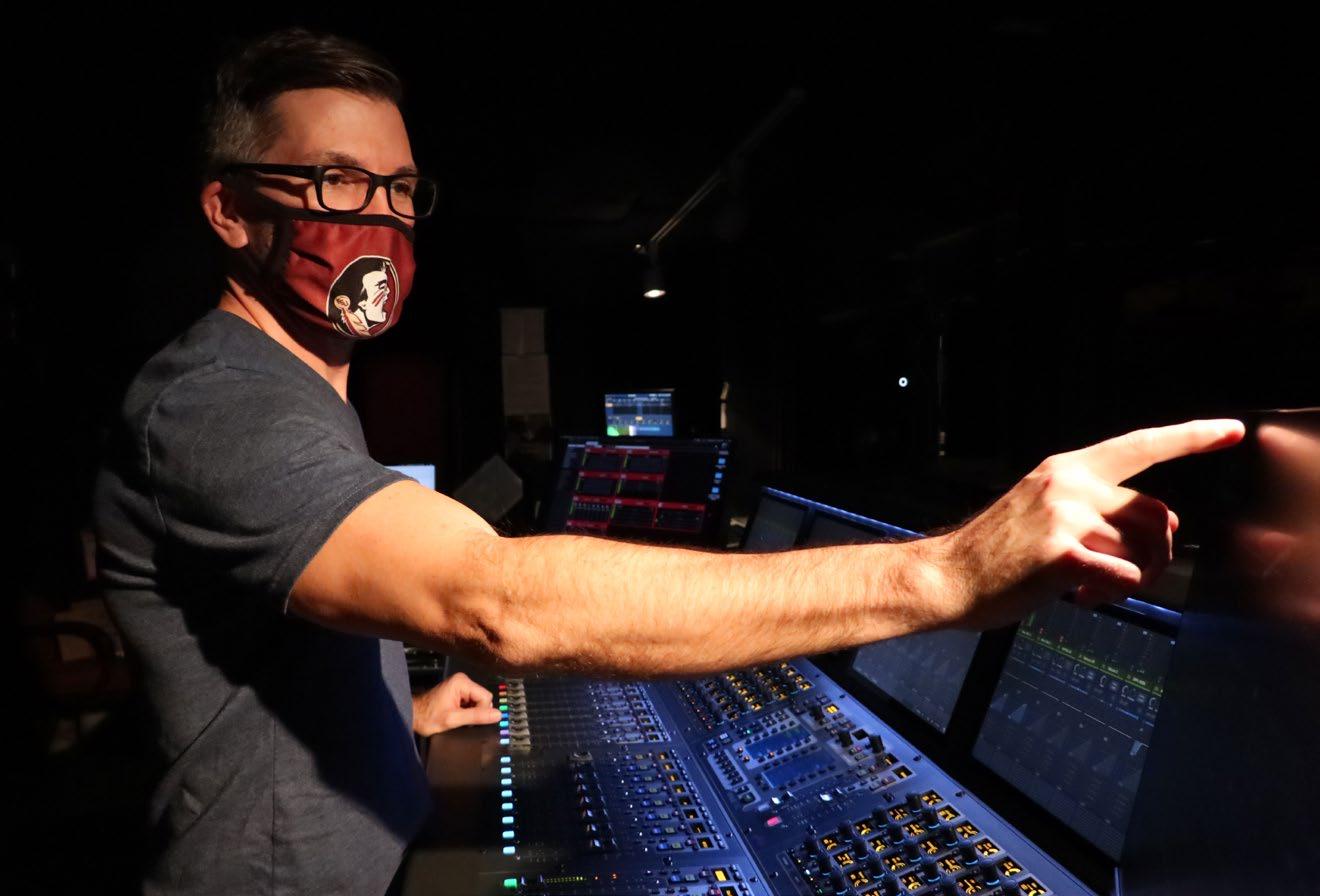
Mike Shapiro, Audio/ Visual Engineer for the College of Music receives training on new live stream equipment.
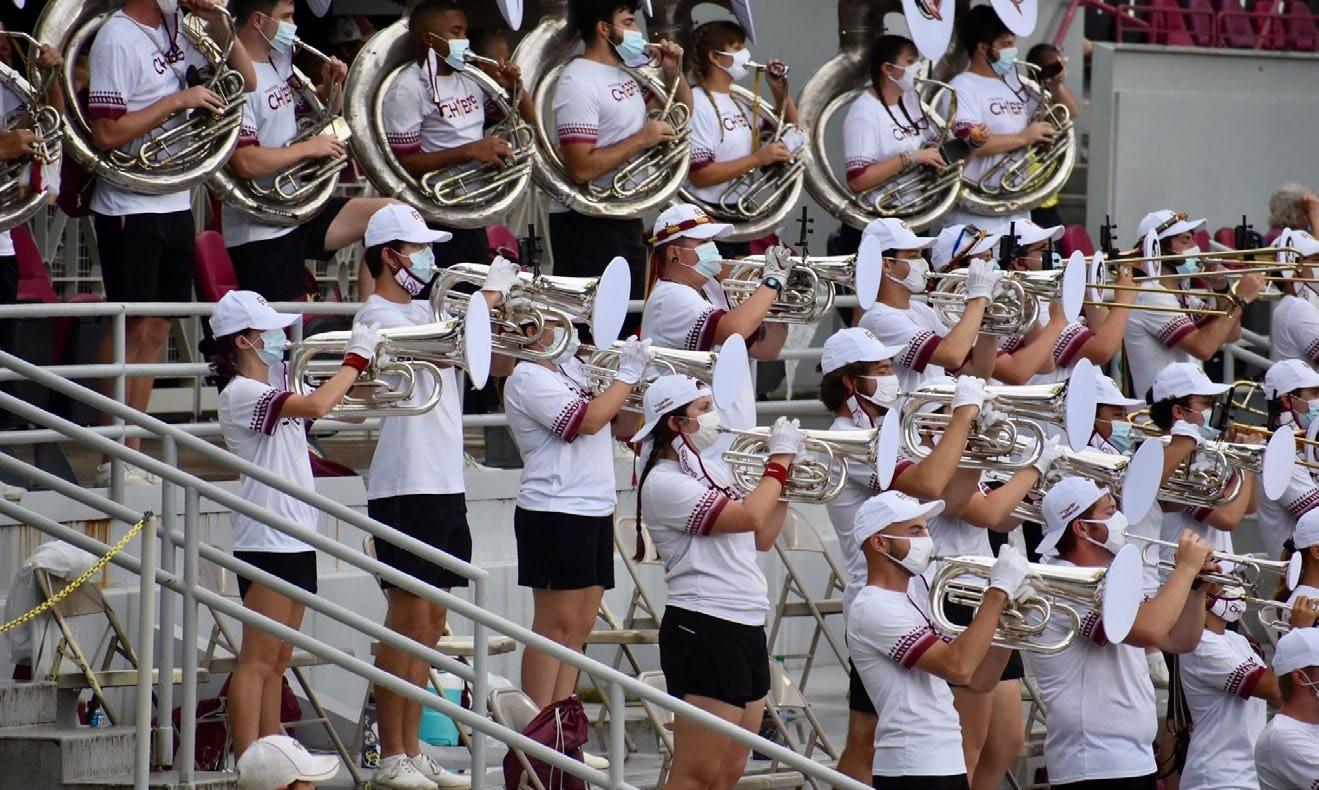
Marching Chiefs practice safe performance techniques from the stands at FSU home games.
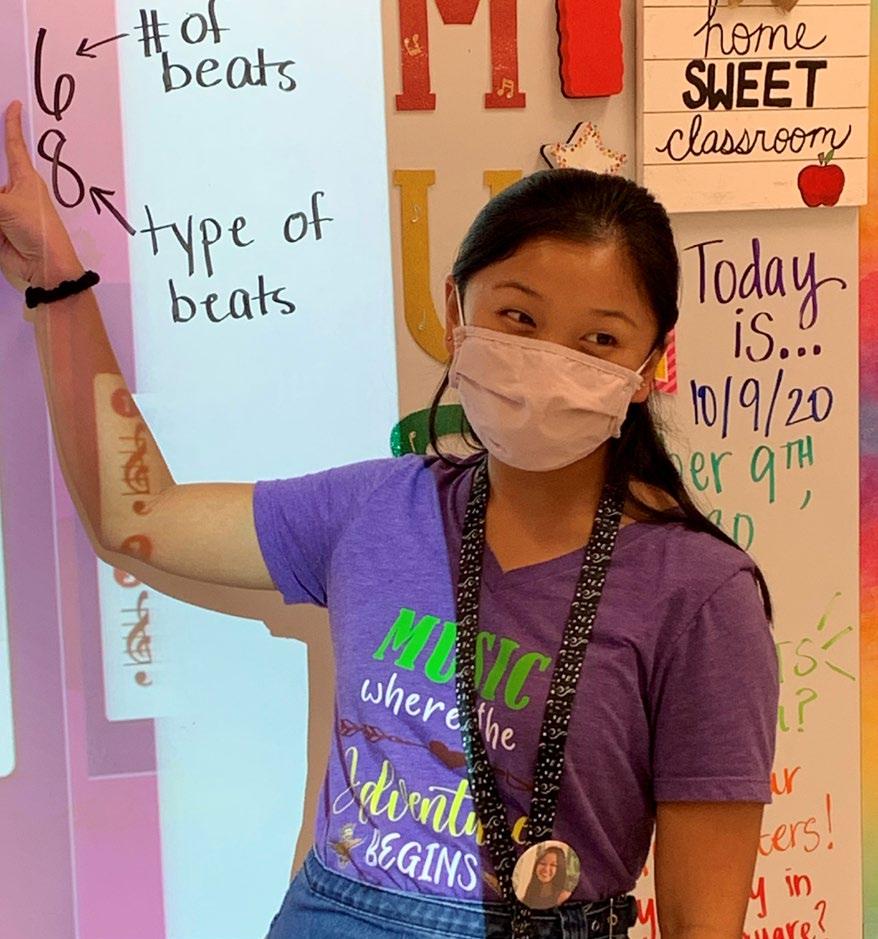
Lindsey Haerle adapts her classroom for socially distanced instruction.
Summer 2020 was certainly a rollercoaster of preparation and optimism as a new leadership team prepared for the College of Music’s return to on-campus instruction for the fall. Administration and staff were joined by several faculty members in dedicating their summer towards researching and discussing safe teaching and performing practices, including newly researched mathematical formulas for room refresh rates, stage capacity, social distancing, and many other safety protocols. While some university music programs decided early in the summer not to offer any fall face-to-face classes, the FSU College of Music crafted the “College of Music Operational Framework,” sharing future plans for a combination of remote and face-to-face classes and the rationale for offering this blended approach. Central to the plan was the determination to provide the best educational experience for students in a demonstrably safe environment.
To address the need for safe social distancing and larger venues, some ensemble rehearsals shifted to the Donald L. Tucker Civic Center, while others were planned for the Owen Sellers Amphitheatre, newly enhanced with the addition of several tents. Outside venues allow a better air refresh environment and the tents can offer some protection from the Florida sun and rain. The warm climate in Tallahassee allows planning to include outside spaces throughout the semester, a true location benefit. Larger classroom spaces in the Diffenbaugh Building, scheduled to be vacant due to planned remote classes, were re-tasked to allow face-to-face applied teaching in larger spaces. New procedures of all spaces in the College were created to ensure a safe environment for all involved. Among these changes was an effort to match all practice rooms to specific studios with carefully assigned use to ensure spacing and refresh times. Masks and disinfectants appeared in many places as did signage reminding everyone of safe practices. Special procedures were developed for the Warren D. Allen Music Library, including limited traffic in the space and new pick up and quarantine guidelines for use of its rich collection.
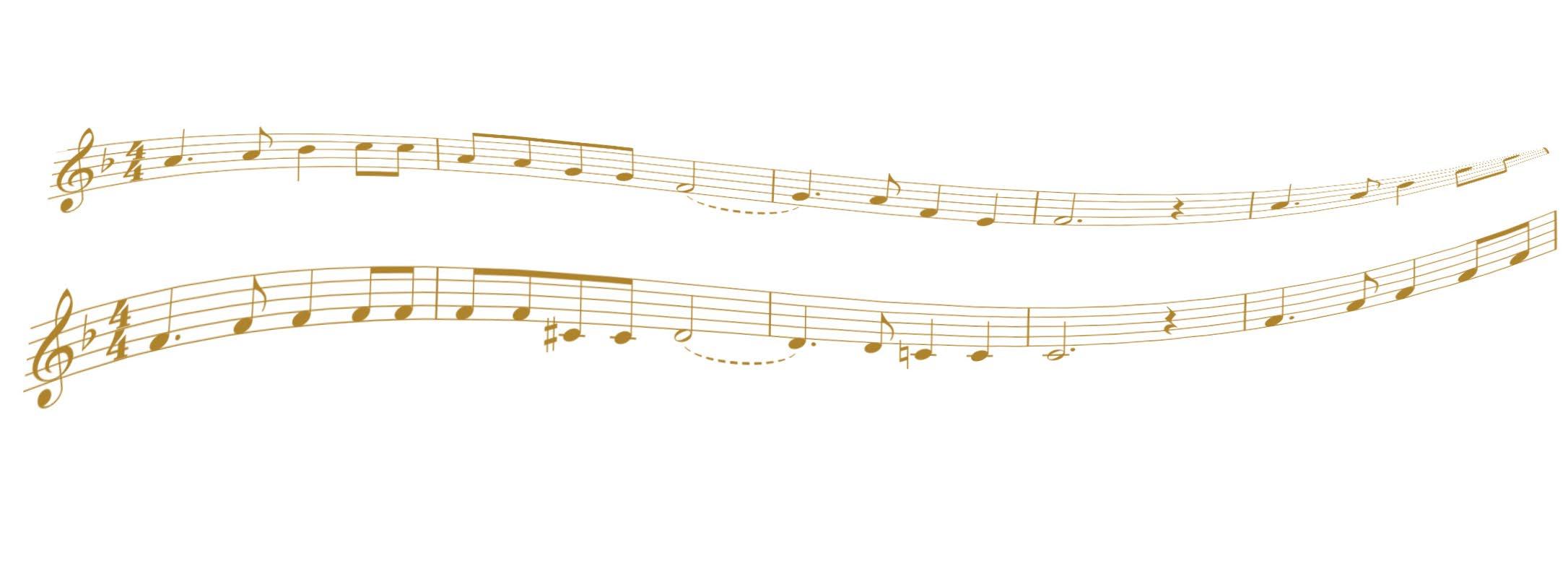
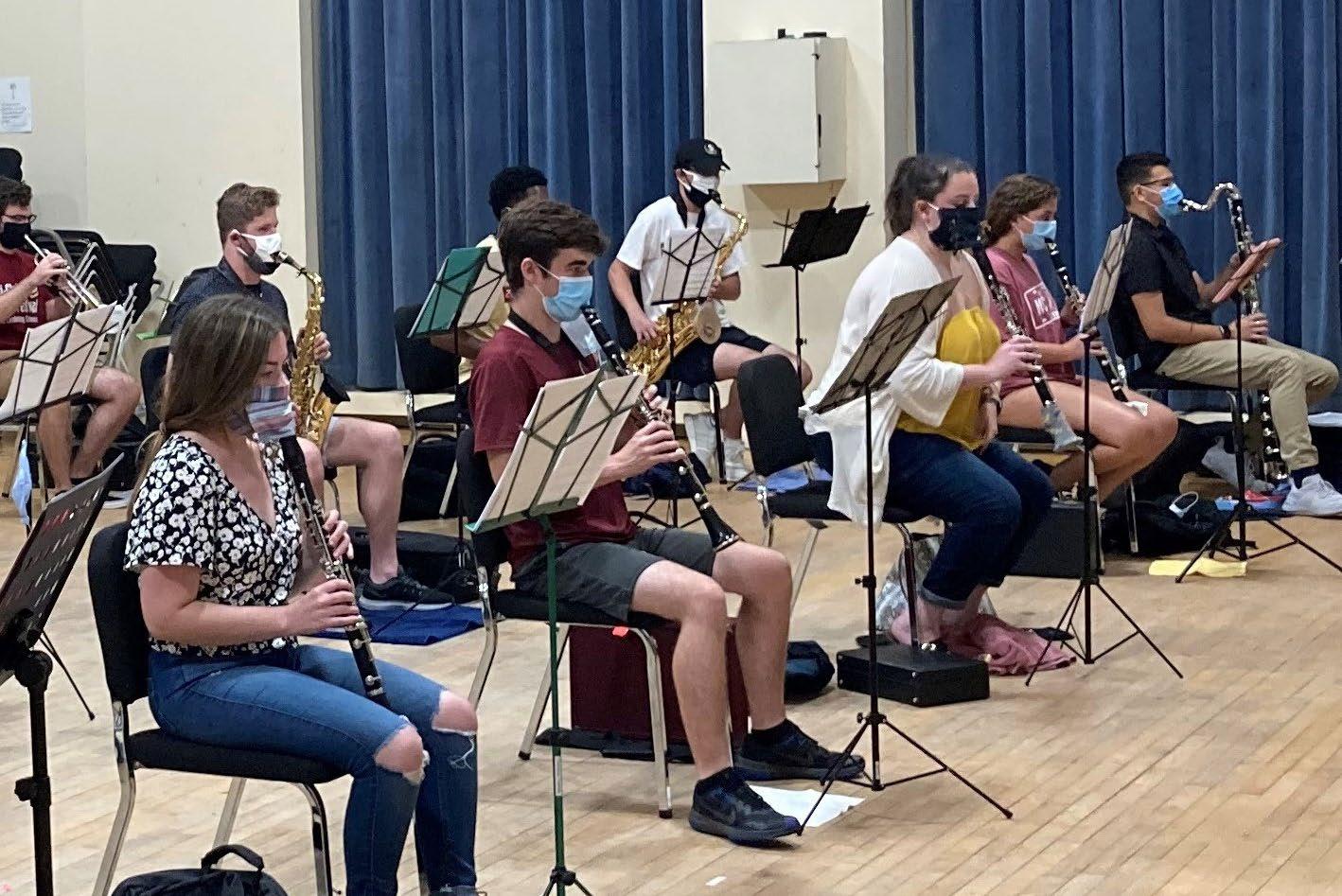
As the College of Music normally hosts over 500 performances per year, early fall plans included special guidelines for ensemble rehearsals and performances. These included sophisticated procedures for audience spacing and traffic in our five busy performance venues. Due to rising COVID cases in Florida during the late summer however, these plans were put aside in favor of a decision to close fall concerts to public attendance. The only exception has been the allowance of a very small number of invited guests to attend degree recitals so that students may share these special moments with family. Although concerts are closed to the public, they are continuing as a vital component of student learning. Planning for concerts without audiences revealed a great need to develop enhanced video recording and live stream capabilities so that performances could continue to be shared with audiences.
The first-ever College of Music video production teams, comprised of existing staff members and graduate students, trained with the local PBS channel WFSU to develop this ability and increase live streaming of performances from Ruby Diamond Concert Hall and Opperman Music Hall. Mike Shapiro, an audio/video engineer who produces concerts in Ruby Diamond Concert Hall for the College, is among the staff and students who are receiving additional training to produce live streaming and video programming. “We had to change our approach and mindset from the way we were addressing our production workflow before COVID-19,” offered Shapiro. “Fortunately, we had great leadership within our team to meet these new demands. We are excited to embrace this new direction.” The addition of new video equipment for use in Dohnányi, Longmire, and Lindsay Recital Halls also has equipped the College to offer video recordings of all degree recitals for the first time. “The new capabilities in the College for sharing our programs via these live stream and video formats is a great step forward as we now reach a more global audience,” remarked Dr. Gregory Jones, who began his position as Associate Dean for Outreach and Engagement in the College in July.

As the fall semester begins, the sounds of the Marching Chiefs again fill the air as they prepare to support the FSU and Tallahassee communities following special conditions created for safe resumption of football games in Doak Campbell Stadium. Band, orchestra, and choral ensembles are set to begin in late September with live stream concerts scheduled throughout the semester. Precautions for these groups include innovative mask designs that allow the playing of wind instruments, as well as coverings for the bells of the instruments. Prior to meeting in-person, ensemble members are utilizing online learning opportunities like University Symphony Orchestra sectionals with members of the Detroit Symphony. Such innovative approaches to teaching by professors like Alexander Jiménez, Music Director Laureate of the Tallahassee Youth Symphony Orchestra, takes advantage of the rare availability of orchestra professionals like DSO hornist Johanna Yarbrough, a Tallahassee native who played in Dr. Jiménez’s Youth Orchestra and studied with FSU Professor of Horn Michelle Stebleton, to train the next generation of music professionals.
2020 will certainly be remembered for its many challenges to education, but the College of Music, with over a century of navigating a constantly changing musical landscape, continues to explore and identify the best possible avenues for moving music forward. Our talented faculty, staff, and students continue onward with the College’s tradition of high-level music, enriched by the special sense of community that we share with thousands of alumni and community supporters.







